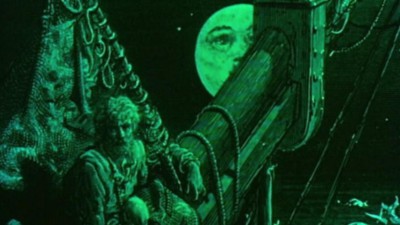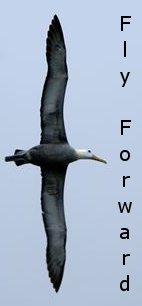So, to recap, I had first heard of the Rime of the Ancient Mariner as a teen in my basement rocking out to Iron Maiden on the turntable. (Party on Garth!). Then I heard it again as an adult looking for something to listen to on my mp3 player while I bicycle commuted to work. (Kind of a technological travelogue, on what will I listen to it next?)

Early on in my daily listening to the Librivox version of Rime of the Ancient Mariner I realized that I was hung up on one particular thing, it’s not a big thing … well actually that’s not true, to me it is a big thing, I mean, I’m not really into poetry and I don’t even know what a “lyrical ballad” is, but whatever it is it better have a story and a story has to have, well, … a point and … what was the point? I know that I liked the story but…
EDITORS INTRUSION – Excuse me for interrupting but I just realized that you may not be familiar with the story that Coleridge was telling in Rime so if you don’t want to click here and see some really trippy 1977 experimental film by Larry Jordan with the poem narrated by Orson Welles …
… then I will paraphrase it for you … thusly.
[quote]
A crazy old man stops a young man on his way to his friends wedding and, holding him in some sort of trance, tells him this cautionary tale. When the old man was a young man he set out to sea. The voyage took the ship and crew beyond where most voyages go and into some pretty creepy waters where ice cliffs threatened to close them off completely and monstrous storms seemed to have it in for them. They had followed an albatross, (which is basically a huge seagull), from warm calm waters into this cold lost abyss, so the mariner, (our old man who is now a young man), being none to bright and certainly not an experienced mariner, opens fire on the bird with his crossbow and kills it dead.
Well, the storms stop, but so does the wind, any wind, all wind. The crew gets a bit nervous after a while and blames our mariner for all their bad luck and hangs the dead albatross about his neck. (I don’t know why, perhaps they all look pretty scroungy and thirsty and alike at this point so they figure this will help remind them exactly who to blame. “Look! It’s the guy with the dead bird around his neck, he’s to blame, get him!”) There they sit for a long time until each of his crew mates drop dead.
Many weird things start happening at this point, Death and his Bride stop by and cast lots for the souls of the crew, the sea around the ship boils up strange green menacing eel like creatures, and our Mariner gets more and more depressed and self pitying, until one day he sees the green eel creatures in a different light, no longer as representations of his own pitiable slavish meaningless existence but as fellow creatures of God, they now look kind of like carefree dolphins, and he falls to his knees in repentance.
The albatross falls from around his neck and he is free. He is almost dead from, thirst, starvation and lunacy, but nonetheless he is free. Then some Spirits stop by while he is lying motionless and dying and they take pity on him by negotiating a truce with the Storm Spirit who apparently was only trying to help when he sent the Mariner’s ship both the storms, to provide wind, AND the albatross to guide them through the storms, and for his efforts the thoughtless men killed the guide bird so the Storm Spirit gets his revenge by removing their wind.
Whatever the spirits do exactly isn’t that clear but a wind picks up and all the corpses of his dead and rotting crew mates rise and start sailing. They skip along at some ridiculous speed while the Mariner is sleeping and then he wakes and rejoins the zombie crew (yay! zombies!) as they approach his home port in England. Just as the Mariner’s ship is spotted by folks on shore it is split in two and consumed by the sea, corpse crew and all.
Only the Mariner survives and is brought to shore where he immediately seeks Christ’s forgiveness from a cave dwelling hermit priest. The story then returns to the Mariner as an old man as he holds spellbound the young partying wedding guest and finishes his tale. It seems the Mariner is bound to an eternal fate of wandering the land and telling his tale to those whom are destined to hear it. The wedding guest is released from the Mariner’s tale and departs a wiser man.
[/quote]
As I was saying before I was interrupted to summarize the tale, (and by the way my summary is just my take on the poem, and I know there is quite a bit of artistic license taken by me in that summary as the poem is written in practically a foreign tongue and without much adherence to what I consider to be the rules of storytelling), anyways, as I was saying … I liked the story, but what was the point? Or, more to the point, what was the point … to me?



